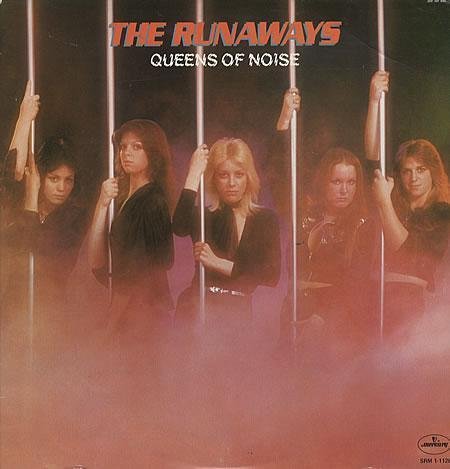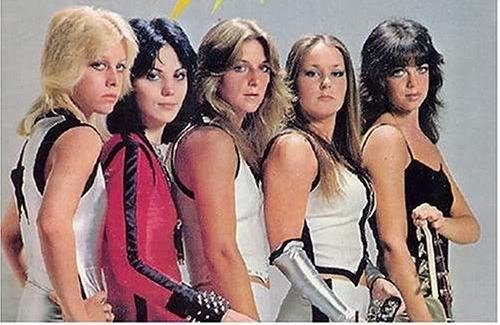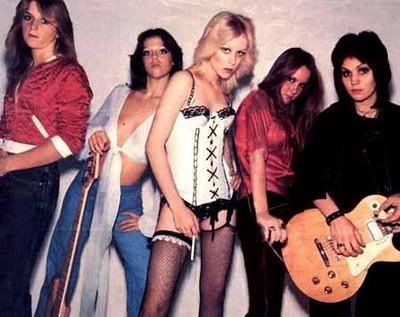THE RUNAWAYS - QUEENS OF NOISE: A Muscular Makeover For Hard Rock's Teen-Girl Dreamers
Album number two for the Runaways is a decidedly different affair from their rough and ready debut. This time, producer/svengali Fowley led his young charges into the high-tech confines of Brother Studios (the Santa Monica recording facility created by the Beach Boys) and spent more time on the music. He also brought in a formidable engineer in the form of Earle Mankey, an ex-member of Sparks and a future member of Concrete Blonde.Thus, it shouldn't be surprising that Queens Of Noise gives a serious makeover to the Runaways sound. The album-opening  title cut clubs the listener into submission with all the changes: the guitars are thickened with echo, the drums are drenched in reverb and the vocal harmonies are multi-tracked to the heavens. The end result makes it sound like everyone's favorite teen-girl hard rock outfit is swinging the Hammer of the Gods.Thankfully, this changeover works. The Runaways was composed of young ladies who dreamed of arena-sized rock stardom and this production style allows them to achieve the grandeur of those dreams. It also feeds into an element of Mott The Hoople-style self-mythology at play within the grooves here: "Midnight Music" has Currie reaching out to her fellow dreamers in the audience as the music behind her balances its rock riffs with sultry, echoed acoustic guitars and creamy vocal harmonies while "Born To Be Bad" is the group's ultimate tough-chick anthem, boasting a killer, snarled chorus that gets amped up by stun-riffs from the guitarists and drum beats that hit like bomb blasts (it's also got a spoken bridge that is the height of juvenile-delinquent melodrama).
title cut clubs the listener into submission with all the changes: the guitars are thickened with echo, the drums are drenched in reverb and the vocal harmonies are multi-tracked to the heavens. The end result makes it sound like everyone's favorite teen-girl hard rock outfit is swinging the Hammer of the Gods.Thankfully, this changeover works. The Runaways was composed of young ladies who dreamed of arena-sized rock stardom and this production style allows them to achieve the grandeur of those dreams. It also feeds into an element of Mott The Hoople-style self-mythology at play within the grooves here: "Midnight Music" has Currie reaching out to her fellow dreamers in the audience as the music behind her balances its rock riffs with sultry, echoed acoustic guitars and creamy vocal harmonies while "Born To Be Bad" is the group's ultimate tough-chick anthem, boasting a killer, snarled chorus that gets amped up by stun-riffs from the guitarists and drum beats that hit like bomb blasts (it's also got a spoken bridge that is the height of juvenile-delinquent melodrama). "Born To Be Bad" is sung by Joan Jett, as is the album's title track, and that underlines another key element of this album - Queens Of Noise finds Jett preparing to become the frontwoman in the band. Two other key cuts that highlight her growing skills are "Hollywood" and "I Love Playing With Fire." The former song is a charming pop-glam item where Joan Jett lays out her plans for rock celebrity over a catchily-riffed tune that boasts great Jett-Currie vocal harmonies. However, the latter tune is the real gem, a stomp-rocker that deploys killer hooks at chorus-time. The fusion of hard rock delivery and pop smarts on these tracks ably forecasts the highlights of Jett's solo career.The only dud on display with this album is its closer, "Johnny Guitar." This dreary, overlong blues-rocker is a spotlight number for Lita Ford, who overloads it with wanky guitar soloing. It's also the one song on the album where the production is off: the sound is murky and buried in echoed, suggesting that
"Born To Be Bad" is sung by Joan Jett, as is the album's title track, and that underlines another key element of this album - Queens Of Noise finds Jett preparing to become the frontwoman in the band. Two other key cuts that highlight her growing skills are "Hollywood" and "I Love Playing With Fire." The former song is a charming pop-glam item where Joan Jett lays out her plans for rock celebrity over a catchily-riffed tune that boasts great Jett-Currie vocal harmonies. However, the latter tune is the real gem, a stomp-rocker that deploys killer hooks at chorus-time. The fusion of hard rock delivery and pop smarts on these tracks ably forecasts the highlights of Jett's solo career.The only dud on display with this album is its closer, "Johnny Guitar." This dreary, overlong blues-rocker is a spotlight number for Lita Ford, who overloads it with wanky guitar soloing. It's also the one song on the album where the production is off: the sound is murky and buried in echoed, suggesting that  Fowley didn't care much for it. Currie namechecks it as the worst Runaways recording in her autobiography and it's hard to argue with her on that point.That said, "Johnny Guitar" is an easily-forgotten stumbling block when one considers how strong the rest of the album is. It should have helped them break into the big leagues but that was unfortunately not in the cards for this hard-luck outfit. Currie would be gone by the next studio album, never managing to find the solo success she deserved. Jett would keep the outfit together for two more albums but never manage to scale the charts or counteract the negative hype they got from the rock press. However, The Runaways live up to their dreams on Queens Of Noise and it's worth hunting down for anyone into the more cultish pleasures of the 1970's rock scene.
Fowley didn't care much for it. Currie namechecks it as the worst Runaways recording in her autobiography and it's hard to argue with her on that point.That said, "Johnny Guitar" is an easily-forgotten stumbling block when one considers how strong the rest of the album is. It should have helped them break into the big leagues but that was unfortunately not in the cards for this hard-luck outfit. Currie would be gone by the next studio album, never managing to find the solo success she deserved. Jett would keep the outfit together for two more albums but never manage to scale the charts or counteract the negative hype they got from the rock press. However, The Runaways live up to their dreams on Queens Of Noise and it's worth hunting down for anyone into the more cultish pleasures of the 1970's rock scene.


